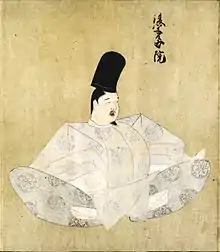1324
Year 1324 (MCCCXXIV) was a leap year starting on Sunday (link will display the full calendar) of the Julian calendar.
| Millennium: | 2nd millennium |
|---|---|
| Centuries: | |
| Decades: | |
| Years: |
| 1324 by topic |
|---|
| Leaders |
|
| Birth and death categories |
| Births – Deaths |
| Establishments and disestablishments categories |
| Establishments – Disestablishments |
| Art and literature |
| 1324 in poetry |
| Gregorian calendar | 1324 MCCCXXIV |
| Ab urbe condita | 2077 |
| Armenian calendar | 773 ԹՎ ՉՀԳ |
| Assyrian calendar | 6074 |
| Balinese saka calendar | 1245–1246 |
| Bengali calendar | 731 |
| Berber calendar | 2274 |
| English Regnal year | 17 Edw. 2 – 18 Edw. 2 |
| Buddhist calendar | 1868 |
| Burmese calendar | 686 |
| Byzantine calendar | 6832–6833 |
| Chinese calendar | 癸亥年 (Water Pig) 4020 or 3960 — to — 甲子年 (Wood Rat) 4021 or 3961 |
| Coptic calendar | 1040–1041 |
| Discordian calendar | 2490 |
| Ethiopian calendar | 1316–1317 |
| Hebrew calendar | 5084–5085 |
| Hindu calendars | |
| - Vikram Samvat | 1380–1381 |
| - Shaka Samvat | 1245–1246 |
| - Kali Yuga | 4424–4425 |
| Holocene calendar | 11324 |
| Igbo calendar | 324–325 |
| Iranian calendar | 702–703 |
| Islamic calendar | 723–725 |
| Japanese calendar | Genkō 4 / Shōchū 1 (正中元年) |
| Javanese calendar | 1235–1236 |
| Julian calendar | 1324 MCCCXXIV |
| Korean calendar | 3657 |
| Minguo calendar | 588 before ROC 民前588年 |
| Nanakshahi calendar | −144 |
| Thai solar calendar | 1866–1867 |
| Tibetan calendar | 阴水猪年 (female Water-Pig) 1450 or 1069 or 297 — to — 阳木鼠年 (male Wood-Rat) 1451 or 1070 or 298 |
| Wikimedia Commons has media related to 1324. |
Events
Date unknown
- Marsilius of Padua writes his defence of the secular state, Defensor pacis.
- Emperor Musa I of Mali arrives in Cairo on his hajj to Mecca, accompanied by an entourage numbering in the thousands, and with hundreds of pounds of gold. This display of wealth garners the Mali Empire a place on European maps in 1395. On his return journey, he peacefully annexes Timbuktu. He is said to have told the Arabic historian Al-Umari that "his predecessors had launched two expeditions from West Africa to discover the limits of the Atlantic Ocean."
- The weak Black Death epidemic spreads through the southern parts of Asia.
Births
- March 5 – King David II of Scotland (d. 1371)[1]
- date unknown
- Prince Dmitry of Suzdal (d. 1383)
- Louis of Durazzo, Count of Gravina and Morrone (d. 1362)
- Constance of Sicily, princess regent of Sicily (d. 1355)
- Giovanni Manfredi, lord of Faenza (d. 1373)
- Prince Tsunenaga, Japanese imperial prince (d. 1338)
- probable – Manuel II, Emperor of Trebizond (d. 1333)
Deaths
- January 8 or January 9 – Marco Polo, Italian explorer (b. 1254)
- February 11 – Karl von Trier, Grand Master of the Teutonic Order
- March 26 – Marie de Luxembourg, Queen of France (b. 1304) (carriage accident)
- June 23 – Aymer de Valence, 2nd Earl of Pembroke (b. c.1275)
- July 16 – Emperor Go-Uda of Japan (b. 1265)
- August 16 or August 17 – Irene of Brunswick, Empress of Constantinople (b. c. 1293)
- August 31 – Henry II of Jerusalem (b. 1271)
- November 1 – John de Halton, Bishop of Carlisle
- November 3 – Petronilla de Meath, Irish servant and suspected witch (burned at stake)
- date unknown
- Dino Compagni, Italian historian (b. c. 1255)
- Hedwig of Holstein, queen consort of Sweden (b. 1260)
- King Sancho of Majorca (b. 1274)
References
- "David II | king of Scotland". Encyclopedia Britannica. Retrieved April 24, 2019.
This article is issued from Wikipedia. The text is licensed under Creative Commons - Attribution - Sharealike. Additional terms may apply for the media files.
